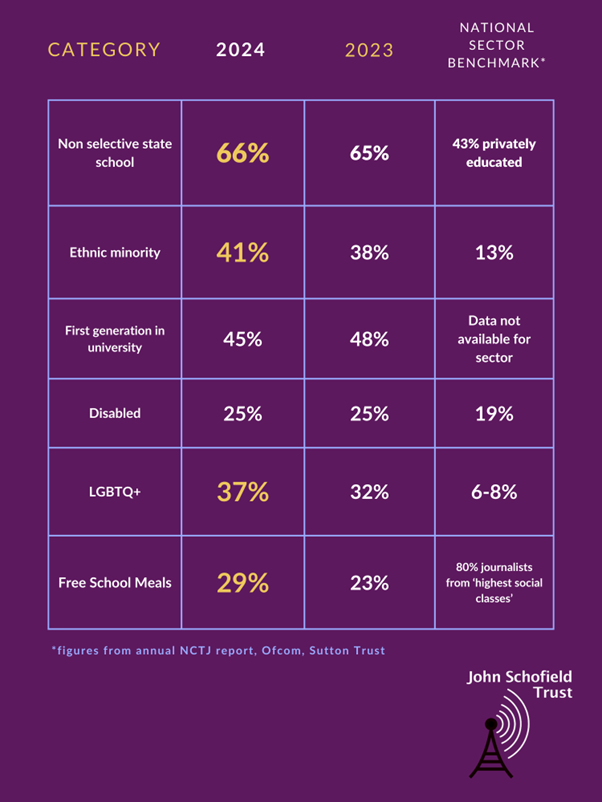We sat down with David Stenhouse, CEO of the John Schofield Trust, to ask about the work of the Trust and why that work is more important than ever. David joined the Trust from the BBC, where he was Editor of the Generation 2014, 2015 and Referendum Generation youth engagement and democracy projects. He has also worked in the United States as a Senior Producer in the BBC’s Washington DC Bureau, and has been a Visiting Professor of Journalism at the University of Strathclyde.
Applications are open now (until 9 June) for the John Schofield Trust’s 2025 scheme of early career and apprentice mentoring.
Who was John Schofield, and why was the Trust founded?
John Schofield was a BBC journalist who was killed in 1995 while covering the war in Yugoslavia. Journalists in the front line are increasingly targeted victims of violence, and John Scofield was one of the first big newsroom deaths of that generation. In the aftermath of his death, his widow, Susie Schofield, received letters from former bosses and colleagues saying how highly they rated John as a journalist and star of the future. She felt, I think, very strongly that he'd never been told that when he was starting out, so she started a charity with the very humane mission of giving young journalists support and encouragement.
The Trust has been supporting young journalists since 1996, and we do that through running a mentoring scheme which matches successful applicants with a professional journalist who supports them for 12 months. I joined the Trust in 2021 as the first chief executive, and amongst the changes that I've been able to introduce is making the Trust both a UK and Ireland charity. We got support from RTE and now run a thriving scheme in Ireland.
The other key thing that I was keen to bring in was to say, journalism is changing: people working at newspapers are making audio and video content for their website, and people in broadcast newsrooms are writing text for a website. The Trust now operates for journalists in print, digital, multimedia and broadcast. The number of mentors and the number of people mentored has gone right up from 49 in the year that I joined to over 200 now.
Tell me about the kind of people who become fellows.
The key thing is that the Trust is now a social mobility and diversity charity. Every year we look at the NCTJ’s annual report about the diversity, or lack of diversity, in newsrooms across the UK. If we have a cohort of fellows who exceed these markers of representation (first generation in university, free school meals, non-selective state schools, ethnic background, LGBTQ+ or disability) then we're creating a pipeline of diverse talent to change the face of newsrooms.
We want to do this to ensure newsrooms can fulfil their civic and democratic duty more effectively. We would argue only newsrooms that represent the audiences they serve can actually get the stories. Dorothy Byrne, former Head of News and Current Affairs at Channel 4, said newsrooms that aren't diverse get the stories wrong, and I totally agree with that.
Skills and training are a key part of what we do, but it’s far bigger than getting jobs for people. It's about ensuring that we are doing our bit to sustain the Fourth Estate to make sure that we have better local democracy and better national democracy. It's a really important mission.

You said that you've benefited from mentoring yourself.
Yes, I've been mentored and I have mentored, and I've found it hugely rewarding.
When I came into this role, I volunteered to mentor for two organizations, the Social Mobility Foundation, and an organisation called Multiverse. I found the experience of mentoring amazingly rewarding, and so when I now speak to more senior journalists, I say to them, being a mentor is an amazing way to enrich your own career. It’s not just about returning good experiences, it’s about enriching your professional experience too.
The kind of people we mentor have 2-5 years' experience in journalism. We realise some people freelance on the way in, and we always look in detail at each individual application. They can be working anywhere in the UK and Ireland, and they can be working any role in journalism. Candidates with backgrounds that are underrepresented in UK and Irish media are encouraged to apply.
The journalism industry has been rocked by huge changes in the past 20 years; is it a challenge to pitch what can be an insecure career in a cost-of-living crisis?
I think it's a really excellent question and I think that you put your finger on the factor which is often missing from this discussion, which is the economic realities faced by individual people, and also the profound structural changes that are occurring in the industry and what that does to the class base of the industry.
When I joined the BBC straight out of university, I had a reasonable expectation that I would have a job that could pay for me to buy a house, that I could have a pension, and that I would be there for a long time. Now those assumptions are not safe for anybody entering journalism.
The great centralisation of the media in London has really damaging effects on our democracy. Local newspapers provided folk from local communities an opportunity to work in an area that they were really interested in, have a nice long career, buy a house, make plans. Those jobs don’t exist anymore.
If you don't have formidable resources, social resources, connections, family connections, money in the bank and an uncle who's happy to let you sleep on his couch in London while you find your feet in the capital... you would really struggle.
One of the things I’m really proud about is this new pilot programme called Journalism Cares, designed for people who have been in the care system - we launched a few weeks ago at Sky. One of the major challenges facing people who come out of the care system is they don't have a ‘usable network’ to support the next stage in their career. We can plug them into our network, so they get access to a usable network of thousands of journalists.
Can the media become more diverse if it remains so focused on London?
London is part of the problem. Britain still has regional newspapers and television, but more and more of the core service comes from the centre.
London is a ruinously expensive city. It concentrates power in the hands of an elite, and the other thing about it is, if you ever say that, then you're immediately dismissed as parochial. London has many great things going for it - wonderful galleries, brilliant cafes, amazing theatre - but there’s absolutely no reason why so much of our media should be centred there, and no reason that so much of our national story has to be told through a London lens. That’s why I’m so pleased to see the BBC and Channel Four making serious commitments to production outside London, and why we are so pleased with work with big publishers like Reach and DC Thomson with big out of London presences.
On entering journalism at any age:
The Trust doesn’t have any age limits - we've mentored people in their late 50s. It’s a question I’m asked a lot, because I've had a mid- to late- career shift - I left the BBC after a three-decade career there and moved into this sector.
There's a bit of a disconnect to me where people talk about us all having to re-train in the future, but the actual support available to people to retrain is often missing. That can be financial support, institutional support, personal support. Retraining is a daunting prospect. I don't think we give enough support to people as they make those mid-career changes, which have to be much more part of the story.
What gives you cause for optimism?
There are lots of reasons for optimism. Being a journalist now is as fascinating as it has ever been. There are more amazing stories to cover than ever before, stories and points of view and perspectives that were marginalised in the past.
Plus, all the amazing work that's being done in data journalism, getting images from Gaza and working out what the evidence tells - amazing journalists doing incredible work, verifying, testing, covering social media.
The young journalists who I speak to are sharp as tacks, full of energy and excited about the future. There's a huge mix to be optimistic about.
Final comments?
The industry has a massive diversity issue. It's too big to be tackled on a paper by paper, broadcaster by broadcaster, company by company basis. It needs organisations like the John Schofield Trust. We're now the biggest, but we need more support. We need more organisations to join our donor pool. We need more organisations to give us their most important and precious capital, which is their human beings, to encourage their staff to mentor for us, to encourage their early career journalists to apply to our scheme.
A lot of my time as chief executive is spent frankly shaking the collection can, and trying to make sure that our small but incredibly impactful charity gets the support it needs to do its work. If you’re reading this, how about buying me the space to do the other bits of the job by picking up the phone, sending an e-mail (david@johnschofieldtrust.org.uk) and supporting our work with a donation, which will allow us to continue to do it and to grow our scheme, so that we have a really powerful impact on the industry in the future.
Applications are open now (until 9 June) for the John Schofield Trust’s 2025 scheme of early career and apprentice mentoring.
